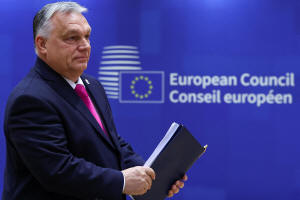Hungary's Orban blocks aid for Ukraine, says he can still halt EU
accession
 Send a link to a friend
Send a link to a friend
 [December 15, 2023]
By Bart H. Meijer, Benoit Van Overstraeten and Krisztina
Than [December 15, 2023]
By Bart H. Meijer, Benoit Van Overstraeten and Krisztina
Than
BRUSSELS/BUDAPEST (Reuters) -Hungarian Prime Minister Viktor Orban
vetoed a major European Union aid package for Ukraine on Friday and
warned he could still halt Kyiv's accession to the bloc after membership
talks won EU approval.
At a summit in Brussels on Thursday, the European Union's 26 other
national leaders took the historic step of agreeing to start accession
negotiations with a country at war, bypassing Orban's grievances by
getting him to leave the room.
But, hours later, they could not overcome resistance from Orban, who
maintains close ties to Russia, to a revamp of the bloc's budget to
channel 50 billion euros ($55 billion) to Ukraine and provide more cash
for other EU priorities such as managing migration.
The Kremlin praised Orban's stance, which spokesman Dmitry Peskov said
impressed Moscow, while criticising the EU, saying the decision to open
membership talks was a politicised one that could destabilise the bloc.
Orban, who has a history of banking on clashes with other EU leaders for
electoral benefit at home, told state radio that he blocked the aid
package to Ukraine - part of a broader multi-year budget plan - to make
sure Hungary gets the funds it wants from the EU budget.

"It is a great opportunity for Hungary to make it clear that it must get
what it is entitled to. Not half of it, or one-fourth," he said.
The breakthrough on a membership path - which also showed the limits of
Orban's power to bend EU decisions his way - came at a critical time for
Ukraine with its counter-offensive against Russian invasion forces
having failed to make major gains and with U.S. President Joe Biden so
far unable to get a $60 billion package for Kyiv through Congress.
Ukrainian President Volodymyr Zelenskiy hailed the approval of
membership talks as a victory for Ukraine and Europe.
Lithuanian President Gitanas Nauseda said as he arrived for fresh talks
on Friday that the decision to start accession talks made him "proud to
be European" and was cause to celebrate, even if it was "only the first
page of a very long, long process".
'BAD DECISION'?
But Orban warned Hungary could still block the talks at any time.
"This is a bad decision," the nationalist leader said. "We can halt this
process later on, and if needed we will pull the brakes, and the
ultimate decision will be made by Hungarian parliament."
[to top of second column]
|

Hungary's Prime Minister Viktor Orban attends a European Union
leaders summit, in Brussels, Belgium December 14, 2023. REUTERS/Yves
Herman/File Photo

The EU leaders ended talks on the financial package, which requires
unanimity, in the early hours of Friday and said they would try
again in January, voicing optimism a deal could be clinched then.
"I can assure you, Ukraine will not be left without support, there
are different ways to do this," Estonian Prime Minister Kaja Kallas
said. "I am pretty confident we will have a solution by January."
Member states could also provide aid individually or strike separate
deals.
"The message to Ukraine is: we will be there to support you, we just
need to figure out a few of the details together," Belgian Prime
Minister Alexander De Croo said.
Although membership would likely be many years away, the decision at
the Brussels summit took Ukraine a step closer to its long-term
strategic goal of anchoring itself in the West and liberating itself
from Russia's orbit.
German Chancellor Olaf Scholz played a key role in getting Orban to
leave the room to clear the way for a decision, diplomats and
officials said.
De Croo, reflecting frustration with Orban, said it was time for the
Hungarian to pipe down.
"If you are part of the decision, you agree with the decision, or
afterwards you just have to keep your mouth shut," he said.
EU leaders reconvened on Friday to discuss other topics including
the Israel-Hamas war.
(Reporting by Krisztina Than in Budapest and Philip Blenkinsop,
Andrew Gray, Gabriela Baczsynksa, Julia Payne, Andreas Rinke, Michel
Rose in Brussels, Bart Meijer in Amsterdam, Benoit van Overstraeten
in Paris, writing by Ingrid Melander; Editing by Nick Macfie and
Clarence Fernandez)
[© 2023 Thomson Reuters. All rights
reserved.]This material
may not be published, broadcast, rewritten or redistributed.
Thompson Reuters is solely responsible for this content.
 |